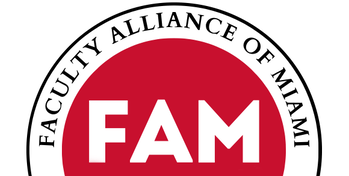
Yes, yes and yes!
In sworn testimony at a state hearing in December, 13 witnesses from the Faculty Alliance of Miami (FAM) (representing TCPL, librarian, tenured, pre-tenure and visiting faculty) detailed the facts of their employment, making a clear case that all faculty share in the work — teaching, research and service — of Miami’s educational mission. That is, we constitute a legal “community of interest” appropriate for a bargaining unit. A single bargaining unit that includes all faculty — like most collective bargaining units at Ohio universities — is what Miami faculty want, need and deserve.
By contrast, Miami’s four witnesses — all executive administrators — claimed that faculty hired at different ranks do such different work that we cannot constitute a community of interest. Administrators also offered their opinions (without evidence) that faculty in different categories would not have each other’s backs at the bargaining table. They argued that precarious faculty would be better represented by administrators than by uniting with their colleagues.
In fact, FAM is supported by a supermajority of faculty precisely because of the failure of Miami administrators to adequately represent our interests. And, as FAM witnesses argued, while all faculty benefit from unionization, it’s precarious faculty who are most in need of the protection of a union and negotiated contract. Administrative witnesses made this crystal clear, claiming that non-tenure-line faculty do not have academic freedom (though Miami’s Policy Library says they do) and highlighting the lack of protections for TCPL faculty should they be nonrenewed or fired.
Administrative witnesses also alleged that a single bargaining unit would be “inefficient.” But multiple negotiations would surely be a nightmare of inefficiency. A single collective bargaining agreement can accommodate the needs of different categories of faculty — and already does so at many universities in Ohio.
Miami’s administration, in an effort to delay a union vote, is attempting to divide faculty. But it is actually the administration that hires people into different levels of precarity. And it is the administration that has made choices harmful to our educational mission. As we saw in 2020, when the administration let go of hundreds of visiting faculty, over 800 of us signed a petition asking them to discuss other options. We had those colleagues’ backs. We had their backs then, and we will have their backs at the bargaining table.
Under Ohio code, the first factor in determining a community of interest that justifies a bargaining unit is “the desires of the employees.” FAM submitted cards to the state in June 2022 demonstrating that a majority of employees want the chance to form a bargaining unit. Miami has had the opportunity to Let Us Vote. Instead, they have delayed, dragged their feet and attempted to divide us.
Faculty do not want to be divided against our own interests. That’s why we continue to build a union by listening to one another — because solidarity is the source of our power.
Signed:
Julie Alexander, First-Year Integrated Core, FSB
Phill Alexander, Emerging Technology in Business and Design, CCA
Ann Elizabeth Armstrong, Department of Theatre, CCA
Ginny Boehme, University Libraries
Michelle D. Boone, Department of Biology, CAS
Mary Jean Corbett, Department of English, CAS
Linh Dich, Departments of English and Languages, Literatures, and Writing, CLAAS
Todd Dupont, Department of Geology and Environmental Earth Science, CAS
Todd Edwards, Department of Teaching, Curriculum, and Educational Inquiry, EHS
Daniel Gladish, Departments of Biology and Biological Sciences, CLAAS
Ryan Gunderson, Department of Sociology and Gerontology, CAS
Mack Hagood, Department of Media, Journalism & Film, CAS
Kazue Harada, Department of German, Russian, Asian and Middle Eastern Languages and Cultures, CAS
Theresa Kulbaga, Departments of English and Languages, Literatures, and Writing, CLAAS
Rachel Makarowski, University Libraries
Shashi Lalvani, Department of Chemical, Paper and Biomedical Engineering, CEC
Paul Larson, Department of Mathematics, CAS
Eric Luczaj, Department of Computer and Information Technology, CLAAS
Deborah Lyons, Department of French, Italian, & Classical Studies, CAS
Richard Moore, Department of Biology, CAS
Zafer Ozdemir, Department of Information Systems & Analytics, FSB
Jason Palmeri, Department of English, CAS
Daniel Prior, Department of History, CAS
Kevin Reuning, Department of Political Science, CAS
Ann Rypstra, Department of Biology, CAS
John Schaefer, Departments of Anthropology and Social and Behavioral Sciences, CLAAS
Paul Schaeffer, Department of Biology, CAS
Matthew Smith, Department of Humanities and Creative Arts, CLAAS
Nancy Solomon, Department of Biology, CAS
Hank Stevens, Department of Biology, CAS
Heeyoung Tai, Department of Chemistry and Biochemistry, CAS
Mike Vanni, Department of Biology, CAS
Cathy Wagner, Department of English, CAS
Anne Whitesell, Department of Political Science, CAS
Amy Yousefi, Chemical, Paper and Biomedical Engineering, CEC

Leave a Reply